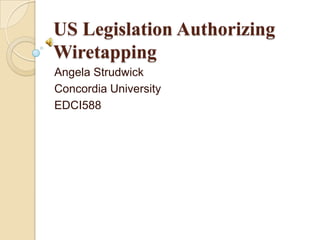
Us legislation authorizing wiretapping
- 1. US Legislation Authorizing Wiretapping Angela Strudwick Concordia University EDCI588
- 2. Wiretapping was declared a felony in the state of New York from 1892, when the telephone was still a novelty. In 1928 the Supreme Court ruled in Olmstead v.United States that wiretapping was not a violation of the Fourth Amendment .
- 4. Title III of the Omnibus Crime Control and Safe Streets Act (1968). “The Wiretap Act”. •prohibits the unauthorized, nonconsensual interception of "wire, or oral communications" by government agencies as well as private parties,* •establishes procedures for obtaining warrants to authorize wiretapping by government officials, and •regulates the disclosure and use of authorized intercepted communications by investigative and law enforcement officers. (Dept. of Justice. 2013).
- 5. . Electronic Communications Privacy Act 1986 The ECPA has three Titles: 1. Title I is an extension of the Wiretap Act. It prohibits the interception of electronic messages or any material that is stored electronically, except by a law enforcement agency with a warrant, and restricts the use of any evidence collected this way to the arrest and trial of persons believed to have committed certain specified types of crimes. 2. Title II, the Stored Communications Act, protects the privacy of communications stored with service providers (emails) and the personal details of subscribers stored by the providers. 3. Title III, prohibits the use of pen registers or trap and trace devices without a court order.
- 7. The USA PATRIOT Act The Patriot Act was enacted by Congress shortly after the terrorist attacks on the Pentagon and the World Trade Center on September 11, 2001. The law provided law enforcement agencies with the authority to: •Use advanced electronic surveillance strategies, including roving wiretaps for surveillance when following suspects in any part of the world who were thought to be a threat to the United States •Share information with all government agencies to prevent money laundering and facilitate speedy apprehension of certain types of criminals •Increase the penalties and eliminate the statute of limitations for crimes of terrorism •Strengthen border security by making entry to the United States difficult for terrorists •Allowing the FBI to demand records that used to be confidential, using National Security Letters.
- 8. THE FIRST AMENDMENT Americans’ Response to the Patriot Act The First Amendment Based on what you have read or heard, do you think the Patriot Act goes too far, is about right, or does not go far enough in restricting people's civil liberties in order to fight terrorism?
- 9. References. Cuellar, J. (n.d.). The Complication Legality of Voice Recording in 2013. In VersaDial. com. Retrieved February 14, 2014, from http://www.versadial.com/the-complicatd-legality-of-voicerecording-in-2013/ Hamm, R. F. (2010). Olmstead vs. United States: the constitutional challenges of prohibition enforcement. . In Federal Judicial Council.gov.. Retrieved February 14, 2014, from http://www.fjc.gov/public/pdf.nsf/lookup/olmstead.pdf/$file/ olmstead.pdf Saad, L. (2004, March 2). Americans generally comfortable with Patriot Act: Few believe it goes too far in restricting civil liberties. In Gallup News Servicer. Retrieved February 14, 2014, from http://www.gallup.com/poll/10858/americans-generallycomfortable-patriot-act.aspx Quinn, M. (2013). Ethics for the information age (5th ed., pp. 276287). Upper Saddle River, NJ: Pearson.
Notes de l'éditeur
- *This section of the law initially prohibited interception of telephone or face-to-face conversations but was updated by Title I of the Electronic Communications Privacy Act in 1986 to include electronic communication. Law enforcement and other government agencies are not exempt from this ruling, although they are authorized to conduct wiretaps provided that they have obtained warrants for that purpose. Title III also regulates the disclosure and use of the information gained through wiretapping. The ECPA also authorizes the use of a pen register to detect the number being dialed on an outgoing call and a trap and trace device to show the number of a caller on an incoming call. (Quinn. 2013).
- Valerie Caproni was general counsel for the FBI in 2011. The present general counsel of the FBI, since January, 2014, is James Baker.
- USA Patriot is an acronym for Uniting and Strengthening America by Providing Appropriate Tools Required to Intercept and Obstruct Terrorism (US Dept. of Justice).A National Security Letter from the FBI states that certain records are related to an ongoing investigation.
- The graph represents the results of a Gallup Poll dated March 2, 2004 based on the question above.